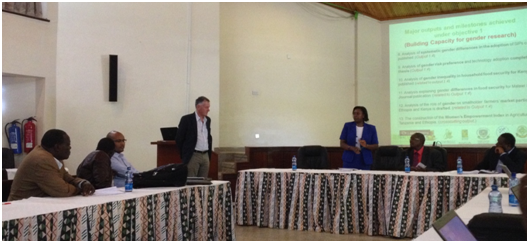Pathways to sustainable intensification in Eastern and Southern Africa: Kenya Mid Term Review
The Adoption Pathways (AP) project, launched early 2013 held its mid-term review in March 2015 two years after the initiation of activities and following the last planting season in late 2014.
This project involves the identification of constraints to and incentives (drivers) for technology adoption in sustainable agricultural systems growing maize and beans. The Adoption Pathways project considers ‘sustainability’ as increasing productivity without negative effects on the environment including soils and water. The project also considers drivers of risk and the role of gender in decision-making on the adoption of technologies.
The AP project built upon SIMLESA, a much larger project, on Sustainable Intensification of Maize-Legume Systems for food security in Africa.
The review team consisted of Richard Brettell and Andrew Alford of ACIAR, and Willis Kosura of the University of Nairobi. After Kenya, the review team proceeded to Harare, Zimbabwe to continue the review for the other eastern and southern African countries.
The review in Kenya brought to light interesting results on gender. One of the key findings is that men and women have different decision making processes in relation to the adoption of intercropping of maize and beans. Moreover, labour by women is higher in all agricultural practices surveyed. Sustainable Agricultural Intensification Practices (SAIP) must take this into account when designing interventions and programs.
In addition, the study results show that farmers in groups are more likely to adopt improved seed varieties and fertilizer packages. Further, those farmers who use a combination of packages reduce risk and earn higher incomes. For example, combining minimum tillage, fertilizer, and soil and water conservation shows promise.
AP is producing large amounts of data useful to SIMLESA and many other projects. The Kenya team has been involved in producing policy briefs and the MOU between CIMMYT and the Tegemeo Think Tank has potential to ‘push’ appropriate policy in government. The data is also useful to MSc and PhD students and the Kenyan team now has a good opportunity to encourage more students to work with them before the data expires.

